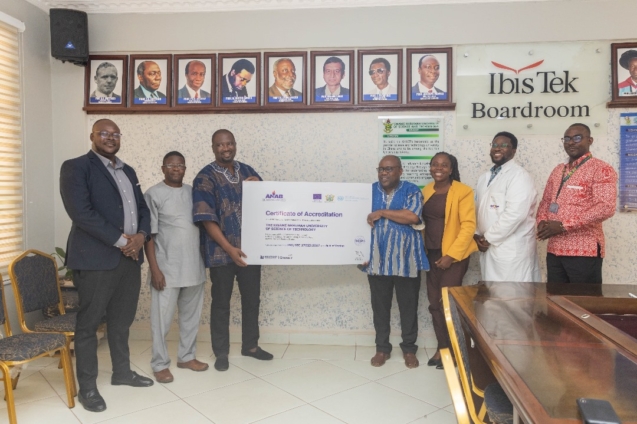The West Africa Competitiveness Programme (WACOMP), implemented by the United Nations Industrial Development Organization (UNIDO) and funded by the European Union (EU), has achieved a significant milestone by supporting the Department of Food Science and Technology Laboratory at the Kwame Nkrumah University of Science and Technology (KNUST) in obtaining ISO/IEC 17025:2017 accreditation for food testing.
This accreditation positions KNUST as the first public university in Ghana to achieve this standard in food testing, thereby enhancing its credibility and capabilities in this vital area.
The achievement of ISO/IEC 17025:2017 accreditation means that small and medium-sized enterprises (SMEs) in Ghana now have access to an alternative product testing laboratory that can provide reliable and credible results for their products. This is crucial for SMEs seeking to meet both local and international market standards, as accredited testing laboratories ensure compliance with rigorous quality standards, which can facilitate market access and enhance consumer trust.
WACOMP aims to improve the competitiveness of West African exports by focusing on key value chains such as cassava, fruits, and cosmetics.
The programme emphasises enhancing value addition, sustainable production practices, and improving access to regional and international markets. By strengthening quality infrastructure and providing technical support for accreditation, initiatives like this at KNUST are pivotal in promoting the overall growth of industries within the region.
The successful accreditation of KNUST’s laboratory is a landmark achievement for Ghana's educational and industrial sectors. It offers SMEs a critical resource for product testing.

This development not only supports local businesses but also aligns with broader efforts to enhance the quality and competitiveness of West African products on the global stage.
The laboratory underwent an on-site assessment conducted by the ANSI National Accreditation Board (ANAB), a recognized international accreditation body in the United States.
This achievement adds to the list of institutions supported by WACOMP Ghana. The Ghana Standards Authority (GSA) Cosmetics Laboratory and the Food and Drugs Authority Cosmetics Laboratory have also received accreditation for ISO 17025, enabling Ghanaian products to be exported with the necessary certifications.
Dr. Charles Kwame Sackey, the UNIDO Chief Technical Advisor, stated, "The most important aspect of program implementation is its sustainability after completion. UNIDO and the European Union are pleased to see that WACOMP's impact continues to support exports and promote Ghanaian brands in the international market."
Prof. Leonard K. Amekudzi, Provost of the College of Science, spoke on behalf of KNUST's Vice Chancellor, Professor Rita Akosua Dickson.
He recounted the challenges students faced in accessing industry-standard equipment for practical training. He expressed gratitude to UNIDO and the European Union for their support, including training, equipment provision, and technical assistance necessary for achieving accreditation.
Prof. Faustina D. Wireko-Manu, Head of the Department of Food Science and Technology, added, "We are thankful to our sponsors—the EU, UNIDO, and WACOMP—for their ongoing support over the years. The accreditation to test cosmetics aligns with KNUST's mission and vision to deliver quality testing methods, contribute to industry growth, protect consumers, and facilitate business growth for food-related enterprises."
The European Union-funded WACOMP is a partnership initiative between the Economic Community of West African States (ECOWAS) and the European Union (EU). It contributes to regional economic integration and underscores the EU's commitment to the Economic Partnership Agreement (EPA) with West Africa.
In Ghana, the programme was implemented by UNIDO in coordination with the Ministry of Trade and Industry (MoTI).
Latest Stories
-
GPL 2024/25: Hearts beat 3-1 Chelsea to return to winning
37 seconds -
Ghana set to host second Flag All-Star Game in Accra
17 minutes -
Angor CREMA: Empowering Ghana’s coastal communities for sustainable growth
53 minutes -
The Legon VC… and childhood memories
2 hours -
The absurd inequality of climate work: Overcoming dilemmas in the green transition
2 hours -
ORAL team receives first dossier of ¢500m National Service ghost names scandal
2 hours -
AfroFuture’s Culture Beach Jam comes off Dec. 28 & 29
2 hours -
NDC gov’t to address first quarter expenditure after January 7 – Ato Forson to Ghanaians
2 hours -
Man sentenced to 5 years for vandalism at Parliament
3 hours -
Art for development: Isaac Koney tells his story
3 hours -
“I prayed for it” – Lady appreciates Joy Prime, Peace Bridals for free wedding gown
3 hours -
CEO Network Ghana pay courtesy call on Mahama
4 hours -
Lady Rhoda features Minister Igwe on new single ‘Thank You’
4 hours -
Labadi Beach Hotel secures court injunction against Polo Beach Club
4 hours -
Vezsel Music releases debut single ‘Asa Papa’ off upcoming ‘Joy In The Morning’ EP
4 hours

